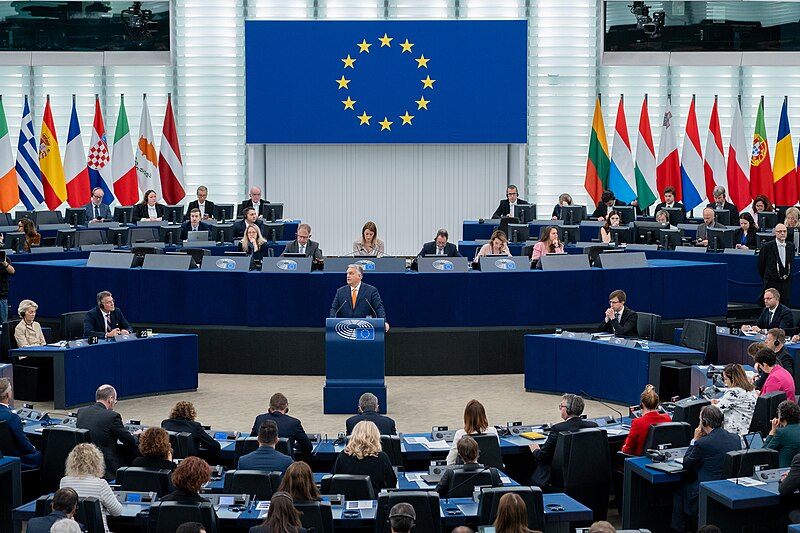Make Orbán Great Again – Hungary’s EU presidency
As Hungary took on the rotating presidency of the Council of the European Union, its Prime Minister Viktor Orbán immediately made headlines with his controversial “peace mission” and a series of bold foreign policy moves. After an explosive start, however, the presidency’s momentum seems to have cooled, leaving many to wonder if Orbán’s subdued approach in recent months is the calm before a tumultuous final push.
Economists tend to describe the patterns of unfolding crises with letters like L, U, or even W, meaning that economic performance can drop fast and stay low (in the shape of an L), or it can drop first and bounce back later in one or more waves (in the shape of a U or a W). Looking at the performance of Hungary’s presidency of the Council, one may wonder which of the letters best describes its track record in the long run. While the so-called “peace mission” of Prime Minister Orbán was widely seen (and criticised) as an unexpectedly bold move in the first days of his country’s presidency, the Hungarian administration’s moves have been surprisingly low profile in subsequent months. Will Mr. Orbán up the ante in the remaining months to regain the initiative in the EU, or shall we expect an unruffled HU24EU for the rest of the year?
Early Concerns about Hungary’s Presidency
Already in the run-up to the Hungarian presidency, there were some concerning signs. As Politico reported, many in Brussels were expecting an unusual presidency, given Mr. Orbán’s reputation as the EU’s provocateur-in-chief. Especially, after the presidency’s slogan “Make Europe Great Again” was revealed and stirred some early controversy among European partners as it was widely seen as a clear indication of the Prime Minister’s preferences. Hungarian diplomats were doing their best to stress that Budapest was aiming to deliver a regular and successful presidency, stressing that Budapest would focus on seven thematic areas, including competitiveness, defence policy, enlargement, illegal migration, cohesion policy, agriculture policy, and demographic challenges. However, European partners were understandably not buying it, especially against the background of Orbán’s track record: After all, under his rule, Hungary has not only cozied up to autocracy, but also lost significant ground in areas like “rule of law”, “political and social integration” and “political participation”, as tracked in the 2024 Bertelsmann Transformation Index (BTI). So, anything but a presidency driven by the political machinations of Orbán – and Orbán alone – would have been a stark surprise.
And then, as if to further highlight Brussels’ concerns, just two days into Hungary’s presidency, Mr. Orbán launched a surprise globetrotting campaign, framed as a Ukraine “peace mission”. He visited Kyiv (for the first time in a decade), Moscow, Baku, Beijing, Washington, and Mar-a-Lago in the first two weeks of July. EU leaders criticized his tour for not coordinating his meeting with Vladimir Putin with partners in advance, and for the Russian side’s presentation of him as representing the entire Union. Unsurprisingly, EU officials reprimanded his trip, and in an unprecedented move, the Commission barred commissioners from attending meetings held in Hungary, while a number of MEPs asked the EU to suspend Hungary’s voting rights, and Mr. Orbán’s speech in the EP was postponed to the autumn. Meanwhile, professional diplomats worked and continue to work hard in the background to deliver on the priorities of the presidency – and according to government officials, this barely visible part of the job is going well. At a recent panel discussion State Secretary Zoltán Kovács and MEP Enikő Győri agreed that most events had been completed as planned, and so far the professionalism of the presidency has in fact been praised in Brussels. In this regard, they particularly pointed out the 250 events that have already been planned and completed as part of the Presidency, and specifically highlighted the ECOFIN meeting of finance ministers, which fits within the broader Presidency’s goal of strengthening financial stability. Also, they stressed the work done on crucial issues such as agriculture and EU competitiveness, noting that other member states did not at all boycott the work of the Hungarian Presidency, but rather operated on a common-sense basis.
Quiet Months: The Calm Before the Storm?
Compared to the spectacular start of the Hungarian presidency in July, recent months have been somewhat quiet. The Hungarian media barely reports on the matter, and the government does not seem keen to make some noise for the presidency either. And indeed, there have been some setbacks for Mr. Orbán, and especially for his peace mission. While European criticism would certainly not discourage him in this respect, feedback from others may have prompted some reassessment in Budapest. Just a couple of days following the Prime Minister’s trip to Kyiv, President Volodymyr Zelensky criticised the “peace mission”, saying that only strong and serious alliances could mediate between Russia and Ukraine.
One month later, in a typical outburst, Dimitry Medvedev said that “idle talk about wonderful peace by unauthorised mediators is over.” Many Hungarian analysts translated his words as a clear and sobering sign that Mr. Orbán’s previous trips were in vain. A few days later, Vladimir Putin himself said that India, China, and Brazil were the countries that could play a role in resolving the conflict. In other words, none of the relevant players have mentioned Hungary as a potential mediator in the conflict. So, has Mr. Orbán decided to back down, or is this rather the calm before the storm?
A Gamble on Trump
It is to be expected that a good portion of that question will be now that Trump emerged out of the US elections victorious. After all, Mr. Orbán has been betting on the return of Donald Trump for many years, and Hungary’s EU presidency coinciding with the U.S. elections and Mr. Trump’s victory offers an opportunity that Mr. Orbán’s ego cannot resist. A second Trump presidency could mean political ascension for the Hungarian Prime Minister. Not only would people acknowledge him as a visionary or strategic wizard, but they could also seek his assistance in connecting with Mr. Trump.
Furthermore, rumour has it that Mr. Orbán would anticipate a reduction in pressure and potentially even a resumption of EU funding for Hungary if he were to serve as an intermediary between Europe and the White House. Of course this is a serious gamble, but he may win big. Especially, because he does not have much to lose, as he is already running short on other options. All in all, with Mr. Trump winning, Europe must brace for a victorious return of Mr. Orbán – and a simultaneous return of his hyperactive presidency of the Council of the early days. In this case, Brussels would look at a U-shape with regards to Orbán’s level of action, a bounce back after a relative period of calm. And that wouldn’t be too surprising. After all, it’s not like Orban has ever stopped playing his games behind the scenes.
First published on Euractiv.

